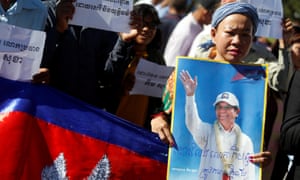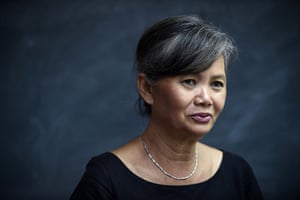 |
| Supporters of jailed opposition leader Kem Sokha outside the appeal court in Phnom Penh. Photograph: Samrang Pring/Reuters |
World must wake up to crackdown in Cambodia, says exiled opposition politician
Democracy ‘dipping fast into a big hole’, says Mu Sochua, after prime minister Hun Sen consolidates grip on power by banning opponents and closing media
The Guardian | 13 October 2017
A senior Cambodian opposition figure has called for the world to wake up to a calculated campaign by long-time prime minister Hun Sen to batter the remnants of its democracy ahead of elections next year.
“Democracy in Cambodia is dipping really fast into a big hole. There is no time to wait or waste,” said Mu Sochua from Berlin. After the Cambodian opposition leader, Kem Sokha, was arrested last month, Mu Sochua, his deputy in the Cambodia National Rescue party (CNRP), fled to Germany.
“Whatever Mr Hun Sen wants, he gets. People are so fearful,” she told the Guardian.
In the run-up to July 2018 polls, the government has shuttered radio stations and newspapers, kicked out civil society groups and last week it attempted to dissolve the CNRP, the main opposition party.
Warning of “the death of democracy” under Hun Sen, Mu Sochua said a government-controlled supreme court was likely to rule in his favour against the CNRP. “That will totally destroy and set back democracy, way back,” she said of the lawsuit against her party, which Human Rights Watch has described as a “naked grab for total power”.
“All the elements for building democracy in Cambodia have not just been weakened, but totally put into silence,” she added.
After the south-east Asian nation emerged from years of war, it has worked ostensibly as a democracy since 1993. While government harassment has been widespread, a reasonably free and critical press has survived, as well as functioning elections every five years.
But it was the June 2017 commune elections – which saw the CNRP take close to 44% of all seats – that proved the resilience of the opposition’s popularity and led to the recent ramped-up purge. The opposition had presented a bona fide threat to Hun Sen’s three decades in power.
The government has since forced the closure of a famed long-running paper, the Cambodia Daily, as well as radio stations that re-broadcast Radio Free Asia and Voice of America’s Khmer language service.
“The ruling party, to make sure they don’t lose the next election, eliminated the independent voices, which is the radio. Because radio really reaches out to the most remote areas,” said Mu Sochua, who is globally renowned for her decades of women’s rights work and even served as a minister in Hun Sen’s coalition government for six years before resigning in 2004.
“It’s been a very, very fast process. A rollercoaster for democracy, going towards the dissolution of the only and the main opposition party in Cambodia.”
Last month, CNRP leader Kem Sokha, a veteran rights campaigner, was arrested by more than 100 police officers and charged with treason. That left the party in the hands of Mu Sochua and two other vice-presidents, one of whom is also outside the country.
Only Kem Sokha’s lawyers can visit him, and when they do guards place a microphone and camera inside the cell, Mu Sochua said. Many of CNRP’s members of parliament, as well as senior party staff, have since fled the country of 16 million people.
Hun Sen has threatened that more opposition leaders are in danger. “This isn’t over yet with one arrest: I would like to send out a message,” he said this month.
Twenty-six opposition MPs, close to half of their parliamentary presence, are already out of the country, Mu Sochua said. Two legislators and a senator are in jail, while seven MPs have court charges against them, she added.
Mu Sochua was warned by two sources, one in the ministry of defence and one in the ministry of interior, that she would be next, she told the Guardian. “I’ve always wanted to stay inside, despite the pressure. But this time, I really do not feel safe,” she said by phone.
Her mission now, she said, is to persuade foreign powers – including Australia, Britain, France and the United States – to implement targeted sanctions and visa restrictions on Hun Sen’s associates, many of whom are hugely wealthy and travel abroad regularly.
Statements of condemnation are not enough, she said. “He couldn’t care less. One more statement and he would just throw it in the bin.
“That’s what the international community has to realise. To wake up, now. It’s not too late for Mr Hun Sen to reconsider. If the international community were to step up their action now, even take one action. It has not happened,” she said.
“Look at the speed at which Mr Hun Sen is pushing. Mr Sokha was arrested on the third of September. I fled just a week ago on the sixth of October … It’s all very much calculated.”
The Guardian contacted the foreign ministries of Australia, Britain, France and the US for a response on Mu Sochua’s request. All expressed concern at the deteriorating political situation but did not make reference to sanctions.
US senators John McCain and Dick Durbin introduced a resolution last week that called on the US state and Treasury departments to consider putting top Cambodian officials on a list that could stop them entering the United States.
Observers say Hun Sen is able to rely on his main global ally, China, to support him financially and politically. When asked about Kem Sokha’s arrest, China saidit “supports the Cambodian government’s efforts to protect national security and stability”.
Meanwhile, Hun Sen is also emboldened by a United States under President Donald Trump that has lessened its criticism of autocratic rulers worldwide.
“China has moved very fast,” said Mu Sochua. “To leave the democratic world, to choose China, it terrifies the people of Cambodia.”
She said the opposition had no plans to run in the next election unless there is change. It would be “political suicide for the opposition because we won’t win because it will be totally rigged … If we play the game of Mr Hun Sen, we may as well kill ourselves politically.”



No comments:
Post a Comment